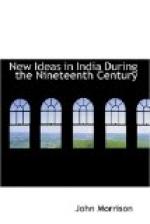[Sidenote: The worship of the new sects—its significance.]
In like manner, the new religious associations seem to feel themselves directly in the presence of God. Congregational worship, a feature new to Hindus, is a regular exercise in the Br[=a]hma Sam[=a]j or Theistic Association of Bengal, the Pr[=a]rthan[=a] Sam[=a]jes or Prayer Associations of Western India, and the [=A]rya Sam[=a]j or Vedic Theistic Association of the United Provinces and the North-West of India. When Rammohan Roy, the theistic reformer, opened his church in Calcutta in 1830, he introduced among Hindus congregational worship and united prayer, before unknown among them and confessedly borrowed from Christian worship.[124] The public worship in all these bodies is indeed not unlike many a Christian service, consisting of Prayer to God, Praise of God, and expositions of religious truth. In a small collection of hymns, “Theistic Hymns,” published some years ago for the use of members of the [=A]rya Sam[=a]j, we find many Christian hymns expressive of this personal relationship to God. We find “My God, my Father, while I stray,” and “O God, our help in ages past.” Neither of these hymns, however, it must be noted, contains confession of sin. Curiously incongruous to our minds is the inclusion among these hymns of poems like “The boy stood on the burning deck,” and “Tell me not in mournful numbers,” and “There’s a magical tie to the land of our home,” etc.[125] Even among the Hindu revivalists, judged by that test of the incoming of public worship, we perceive the growth of the idea of personal relationship to God. A recent publication of that party is “Songs for the worship of the Goddess Durga.” One of them, we may note in passing, is the well-known hymn, “Work, for the night is coming.” All such personal relationship, we again repeat, is incompatible with pantheism, and almost equally so with the popular sacerdotalism. Not without significance do the new theists of Western India call their associations the Pr[=a]rthan[=a] Sam[=a]jes or Prayer Associations, and give to the buildings in which they worship the name of Prayer Halls instead of temples. Let not men say that religion and theological belief belong to separable spheres.
[Sidenote: The idea of sin naturally accompanies the new monotheism.]
Once more, the public worship and prayer attendant on the new monotheism of the new religious associations are the signs that the stage has been reached where sin will be felt and confessed. As yet, however, it cannot be said that the thought of sin is prominent. In the creeds of the [=A]rya Sam[=a]j and the Pr[=a]rthan[=a] Sam[=a]jes, the word sin does not occur. What we find in the Br[=a]hma Sam[=a]j is as follows. From the creed of the Southern India Br[=a]hma Sam[=a]j, of date about 1883, we quote paragraph 7: “Should I through folly commit sin, I will endeavour to be atoned [sic] unto God by earnest repentance




